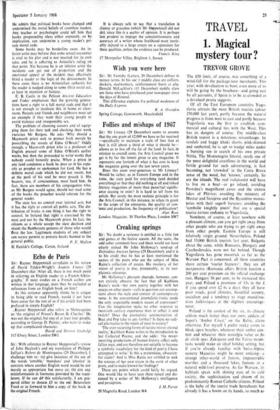Creaking springs
Sir: No doubt a reviewer is entitled to a little fun and games at the festive season. All the same, the odd sober comment here and there would not have utterly ruined Mr John Holloway's send-up of Defending Ancient Springs (29 December); and it is to his credit that he has at least mentioned the names of the poets who are the subject of Miss Raine's collection of essays. His mockery of her vision of poetry is due, presumably, to its neo- platonic reference.
Mr Holloway's pleasant charade, however, can- not entirely obscure the fact that all Kathleen Raine's work—her own poetry together with her essays on other poets—calls in question our assump- tions about the style and content of contemporary verse. Is the conventional journalistic-ironic mode the only respectable modern means of expression? Can the imagination make no other response to twentieth century experience than to reflect it and twitch? Does the journalistic sentimentalism of Beat and Pop take us any further? Is there no radi- cal alternative to the vision of man in society?
'The ever-recurring forms of nature mirror eternal reality,' Kathleen Raine writes in the introduction to her Collected Poems; and she adds: `the never- recurring productions of human history reflect only fallen man, and are therefore not suitable to become a symbolic vocabulary for the kind of poetry I have attempted to write.' Is this a pretentious, obscuran- tist claim? And is Miss Raine not entitled to seek the sources of her own vision in the work of other poets, and to make known her findings?
These are points which could fairly be argued. One would like to have seen them raised and dis- cussed by a writer of Mr Holloway's intelligence and perception.
1. M. Purser
50 Magnolia Road, London W4


































 Previous page
Previous page